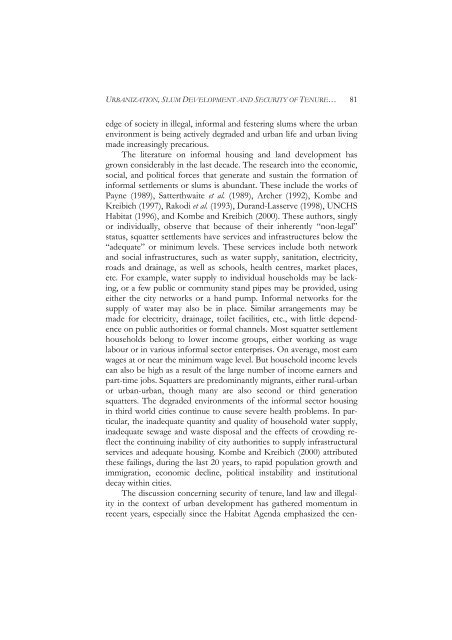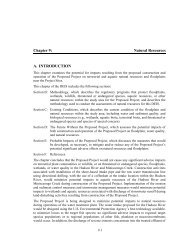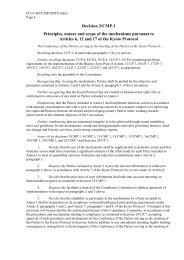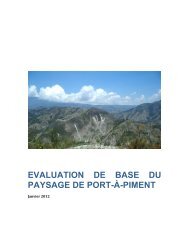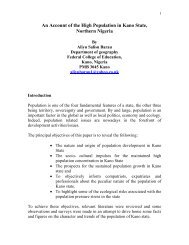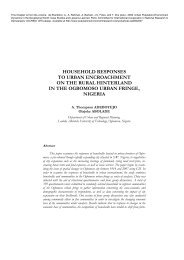urbanization, slum development and security of tenure - Center for ...
urbanization, slum development and security of tenure - Center for ...
urbanization, slum development and security of tenure - Center for ...
Create successful ePaper yourself
Turn your PDF publications into a flip-book with our unique Google optimized e-Paper software.
URBANIZATION, SLUM DEVELOPMENT AND SECURITY OF TENURE… 81<br />
edge <strong>of</strong> society in illegal, in<strong>for</strong>mal <strong>and</strong> festering <strong>slum</strong>s where the urban<br />
environment is being actively degraded <strong>and</strong> urban life <strong>and</strong> urban living<br />
made increasingly precarious.<br />
The literature on in<strong>for</strong>mal housing <strong>and</strong> l<strong>and</strong> <strong>development</strong> has<br />
grown considerably in the last decade. The research into the economic,<br />
social, <strong>and</strong> political <strong>for</strong>ces that generate <strong>and</strong> sustain the <strong>for</strong>mation <strong>of</strong><br />
in<strong>for</strong>mal settlements or <strong>slum</strong>s is abundant. These include the works <strong>of</strong><br />
Payne (1989), Satterthwaite et al. (1989), Archer (1992), Kombe <strong>and</strong><br />
Kreibich (1997), Rakodi et al. (1993), Dur<strong>and</strong>-Lasserve (1998), UNCHS<br />
Habitat (1996), <strong>and</strong> Kombe <strong>and</strong> Kreibich (2000). These authors, singly<br />
or individually, observe that because <strong>of</strong> their inherently “non-legal”<br />
status, squatter settlements have services <strong>and</strong> infrastructures below the<br />
“adequate” or minimum levels. These services include both network<br />
<strong>and</strong> social infrastructures, such as water supply, sanitation, electricity,<br />
roads <strong>and</strong> drainage, as well as schools, health centres, market places,<br />
etc. For example, water supply to individual households may be lacking,<br />
or a few public or community st<strong>and</strong> pipes may be provided, using<br />
either the city networks or a h<strong>and</strong> pump. In<strong>for</strong>mal networks <strong>for</strong> the<br />
supply <strong>of</strong> water may also be in place. Similar arrangements may be<br />
made <strong>for</strong> electricity, drainage, toilet facilities, etc., with little dependence<br />
on public authorities or <strong>for</strong>mal channels. Most squatter settlement<br />
households belong to lower income groups, either working as wage<br />
labour or in various in<strong>for</strong>mal sector enterprises. On average, most earn<br />
wages at or near the minimum wage level. But household income levels<br />
can also be high as a result <strong>of</strong> the large number <strong>of</strong> income earners <strong>and</strong><br />
part-time jobs. Squatters are predominantly migrants, either rural-urban<br />
or urban-urban, though many are also second or third generation<br />
squatters. The degraded environments <strong>of</strong> the in<strong>for</strong>mal sector housing<br />
in third world cities continue to cause severe health problems. In particular,<br />
the inadequate quantity <strong>and</strong> quality <strong>of</strong> household water supply,<br />
inadequate sewage <strong>and</strong> waste disposal <strong>and</strong> the effects <strong>of</strong> crowding reflect<br />
the continuing inability <strong>of</strong> city authorities to supply infrastructural<br />
services <strong>and</strong> adequate housing. Kombe <strong>and</strong> Kreibich (2000) attributed<br />
these failings, during the last 20 years, to rapid population growth <strong>and</strong><br />
immigration, economic decline, political instability <strong>and</strong> institutional<br />
decay within cities.<br />
The discussion concerning <strong>security</strong> <strong>of</strong> <strong>tenure</strong>, l<strong>and</strong> law <strong>and</strong> illegality<br />
in the context <strong>of</strong> urban <strong>development</strong> has gathered momentum in<br />
recent years, especially since the Habitat Agenda emphasized the cen-


